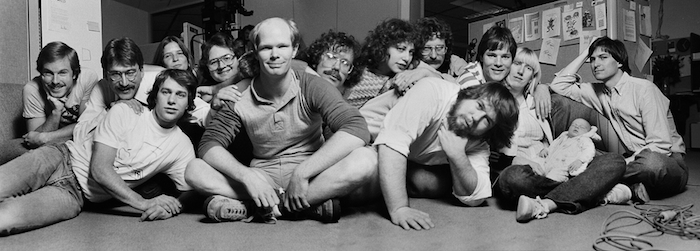Where Are All The WoC Hackers In Movies?
on May 27th, 2015Movies are not known for having a diverse representation of programmers. Jobs doesn’t include any women programmers or designers, even though women were on the original Macintosh team. Susan Kare, who designed all of the original icons and fonts, doesn’t even get a cameo. The only women shown in the film are Jobs’ family members, lovers, and secretaries.

Early Macintosh Team (image source)

“Jobs” Movie Macintosh Team (via Yahoo! Movies, from the official trailer)
Jobs is only one example among many, sending the message that women aren’t smart, inventive or tech savvy enough to be hackers, and aren’t important enough to be recognized as more than side characters in the male protagonist’s story.
There are a few movies which do feature women hackers: Matrix (Trinity), Hackers (Kate), Girl with the Dragon Tattoo (Lisbeth), and even TV shows like Criminal Minds (Penelope), Arrow (Felicity) and NCIS (Abby).
While this is a step in the right direction, does the film industry believe that all women techies are white? Women programmers are almost never played by black, latina, native or asian women. The film and TV industry sends the message to women of color that we are not hackers, or at least not supposed to be. Casting hacker characters as primarily white men, and sometimes white women, leaves women of color out of the picture. Lack of representation and exposure is one reason why black women make up the lowest percentage of programmers in the tech industry (less than 1%): if you don’t see anyone who looks like you in a particular field or job, you are less likely to venture into it.
What Furious 7 Does Differently (And Not)
I saw Furious 7, and because I am not into action films I was nearly falling asleep until the character “Ramsey” was revealed. (Warning: spoilers ahead.)
Ramsey created a dangerous and highly technical software that could track anyone at anytime, hacking into computer and phone cameras and voice streams and leveraging facial recognition technology to locate targets. The Fast and Furious (FF) team was working to keep the software out of the villain’s hands: the codes was a pivotal part in the film, because everyone was fighting to keep it for themselves. As a proud nerd, I was excited to hear them explain the software, but I wasn’t looking forward to seeing the reveal of its creator.
The FF team was assigned a mission to capture the mysterious “Ramsey,” and surprisingly, Ramsey turned out to be Megan Ramsey, a black woman played by Nathalie Emmanuel.

Nathalie Emmanuel (via Yahoo! Movies)
When the FF team sat down with Ramsey after the mission was complete, Tyrese’s character Roman had a lot to say to her: “You’re the hacker? That’s not what a hacker is supposed to look like.” Ludacris’s character Tej defends Ramsey, asking Roman, “Well then what is a hacker supposed to look like?”.
I hoped it would end there, conveying that yes, black women can be hackers, too. But of course it didn’t. Roman went on to say that hackers were supposed to be pimply, pale, nerdy white guys who live in basements. Although Tyrese was perpetuating hacker stereotypes, Ramsey’s place in the movie counters the stereotype. But in another scene, the FF team is at the beach, and the camera does a slow-motion pan on Ramsey coming out of the water. Roman comments that she’s too beautiful to hide behind a computer. This objectification shows that even when we do have characters like Ramsey, we have a long way to go in getting representation that is not focused on a woman’s physical body, but on the skills she brings to the table.
How Ramsey Defies Media Stereotypes of Black Women
Despite the reinforcement of some stereotypes, I was still happy to see Ramsey on the screen, hacking and saving the day with her technology skills. I also appreciated that the film didn’t pair her off as one of the male characters’ lovers. She stood on her own as the infamous hacker who created the software at the center of the movie.
Media representation of black women is often geared towards reality shows like Basketball Wives and Love and Hip Hop. These reality shows frequently perpetuate the angry black woman stereotype and show black woman as loud, aggressive and argumentative. Melissa Harris-Perry writes about the stereotypes of black women in her book Sister Citizen, noting that media representation of black women often falls into the categories of video vixen, mammy, or angry black woman.
Ramsey’s character in Furious 7 does not fall into any of these categories. It was so refreshing and relieving to watch a black woman on screen, portraying a different image than what the media usually portrays. As a black woman who is also a programmer, it meant a lot to me to watch Ramsey and know that millions of other people are seeing a black woman being inventive, smart, and just plain badass on screen too. I know that some people watching would have never thought “black woman” and “programmer” could be in the same sentence. Ramsey combats the perceived norm and brings light to the fact that programmers can be anyone. It makes me hopeful that one day there can be a future where seeing characters like Ramsey is the norm.